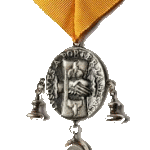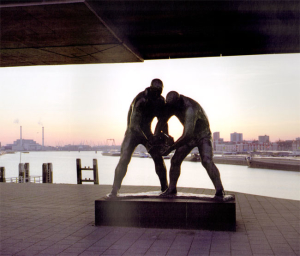The Netherlands in 2014
To understand the novel and the satire in it better it is useful to know the context in which the story takes place. The author, Dave Dröge, grew up in Vlaardingen, in the shadow of the harbor Pernis. Across the Waterweg (by the people of Rotterdam called the ‘Nieuwe Maas’) lies the heavy chemical industry of the port of Rotterdam and the Maasvlakte, one of the biggest harbors in the world. The emissions caused regular nuisance in the seventies and eighties. Stricter guidelines improved the quality of the air and, still a bit ironically, in 2009 Vlaardingen actually won the title: ‘Greenest City in the Netherlands’.
The Game Changer was written in Vlaardingen, the city of the ‘Geuzen Medal’. Since 1987 the Geuzenpenning Foundation has awarded a Geuzen Medal every year as a tribute to individuals or institutions that have, in some special way, devoted themselves to fighting for democracy or against dictatorship, discrimination and racism.

At the time of emerging ICT era in which the author went to work as a programmer and software designer, the metal companies and shipyards where his father and other relatives worked got into trouble: some companies closed their doors. However, the work ethic remained a high priority. Work harder, not talk but polish, was the prevailing morality. Workers from other countries were admitted and accepted, provided they cooperated and worked in and around the harbor. If they did their best and wanted to work for a living, there was nothing to worry about. This kind of values increasingly came under pressure by social developments and modernization, globalization of goods, labor and business, and the associated global – whether or not staged – crises. The multinationals got more and more power, allowing local issues to be considered (whether it was political, social or cultural in nature) as not much more than a tough hurdle on the way to even more success, more growth and more profit. Hard work for the cause as a whole seemed to slowly but surely disappear, it seemed useless: you had to present yourself personally in the labor market. The employee became a redeemable number: for you ten others where standing in line unless you could make yourself (apparently) indispensable.